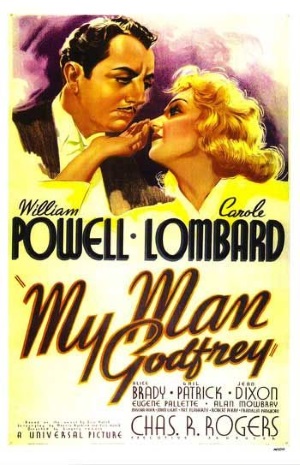It’s Truly a Wonderful Life
***This Review Contains Spoilers***
You Can’t Take It With You follows the Sycamore/Vandrerhof household; the ultimate eccentric family. In fact eccentric probably isn’t the right word, they’re complete nuts. They live a counter-cultural lifestyle of not working or paying taxes (and somehow getting away with it) and doing whatever makes them happy without a care in the world; people who aren’t afraid to live. There are like cartoon characters who can twist their way out of any situation with people more in tune with reality, such as when Grandpa Vanderhof (Lionel Barrymore) manages to convince the timid Mr. Poppins (Donald Meek) to stop throwing his life away working as a bureaucrat and start having fun. The Sycamores/Vanderhofs are families we probably can’t be in real life but wish we could.
Even with a large ensemble cast, Lionel Barrymore is the actor at the heart of the film in a role which is the polar opposite of his part of Henry F. Potter in Frank Capra’s It’s a Wonderful Life. The scene in which Vanderhof is confronted by a government official played by the always miserable looking Charles Lane feels like a dig at big government. When Grandpa asks the official what the government gives him for his money he is given the response of “The government gives you everything”, emphases on the word everything, followed by Vanderhof’s humorous but thought-provoking rebuttals. The family’s refusal to pay taxes may be ethically questionable but it’s a movie fantasy and could never happen in real life. Don’t you wish you could deal with bureaucracies as easily as Grandpa Vanderhof?
One of Grandpa Vanderhof’s other fascinating moments is his monologue on “ismmania” although I’m quite sure what to make of it (“when things go a little bad nowadays you go out and get yourself an ‘ism’ and you’re in business”). The message feels similar to a 1948 animated short “Make Mine Freedom” in how the danger of isms can cripple the people. All we need is our Americanism as Vanderhof proclaims, which itself is an ism but I digress. Regardless his line which following this, “Lincoln said, with malice toward none, with charity to all – Nowadays they say think the way I do or I’ll bomb the daylights out of you”; that gives me chill every time.
One the sweetest, most heartwarming scenes in any film ever is when Grandpa Vanderhof tells Alice Sycamore (Jean Arthur) about his love for his deceased wife and how the room still smells of her perfume. Ugh, it just kills my poor little soul; a perfect display of Capra’s gift for directing very intimate, emotional scenes in which the rest of the world ceases to exist. Likewise, there doesn’t seem to be any actress whom James Stewart didn’t share a great dynamic together. James Stewart and Jean Arthur share a perfect chemistry together, pairing the embodiment of the everyman and the embodiment of the everywoman.
Non-conformity is the name of the game in You Can’t Take It With You. Grandpa Vanderhof understands the preciousness of life as he pursues his own interests and his own forms of fulfillment. He encourages others to follow their dreams and not submit to the will of others. In one scene Alice speaks of Grandpa’s thoughts on how “most people are run by fear, the fear of what they eat, fear of what they drink, fear of their jobs, their future, their health, scared to save money and to spend it. People who commercialise on fear scare you to death to sell you something you don’t need”. Amen sister! – The only thing to fear is fear itself.
You Can’t Take It With You promotes what we would now refer to as a libertarian mindset, live and let live as long as you’re not hurting anyone. As Tony Kirby (James Stewart) tells his father Antony P. Kirby (Edward Arnold) towards the end of the film, “I think this business is great. It’s good for you because you like it. I don’t, and I never will”. In many ways the Sycamore/Vandrerhof family is the embodiment of the American Dream. They own their property, each member pursues their individual dreams and they are above all happy. They live their life without inference from the government or other such bodies: Life, liberty and the pursuit of happiness.
One of the other messages derived from You Can’t Take It With You is the same as that to come from the ending of It’s a Wonderful Life in which the townspeople come to George Bailey’s aid, giving him money so he won’t have to do jail time followed by the final message from the angel Clarence; “No man is a failure who has friends”. A very similar incident occurs in YCTIWY in which friends and neighbors of the Sycamores pay for their fine in night court so they won’t be locked up. Likewise, the family’s arrest for being mistakenly identified as communists feels like a foreshadowing to McCarthyism. Then again they should have thought that a fireworks show based on the Russian Revolution as well as advertising it perhaps isn’t the greatest idea; it stinks!
There are those who will hear the name Frank Capra and have a reaction along the lines of “Oh Frank Capra, sentimental, saccharine, manipulative rubbish”. I don’t make apologies when I say that dismissing a film for being sentimental is the nonsense film criticism to end all nonsense criticisms; it stinks! Newsflash, stories have been manipulating people’s emotions since the dawn of time. Pulling of effective sentimentality is a skill and I have not come across a single good reason as to why it is a problem. You Can’t Take It With You is Capra at his most sentimental, manipulative, saccharine and all those other dirty words and I love it for that. So if that’s the crime of the century, then lock me up for life. Capra-corn and proud of it!


